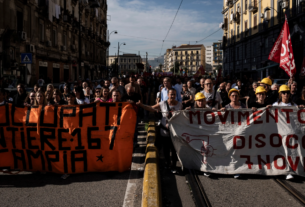North Korea continues to face intense global criticism for its severe human rights abuses, with reports from defector groups highlighting the mistreatment of its citizens. Reports indicate that North Koreans endure forced labor, torture, and brutal punishment for even minor offenses, and the government has made no effort to address these issues.
“North Korea has created a system of extreme oppression that affects every part of its citizens’ lives,” said a human rights expert. “The government’s control over its people is absolute, and any attempt to challenge that control is met with severe consequences.”
Individuals who attempt to escape the country often face the harshest punishments, including torture or execution. Many who are caught trying to flee end up in labor camps, where conditions are so severe that many do not survive the experience.
“The suffering inside these labor camps is unimaginable,” said a former prisoner. “We were forced to work for long hours under horrible conditions, and anyone who complained was severely punished.”
Despite widespread international condemnation, North Korea has shown no sign of reforming its treatment of citizens. The government maintains strict control over access to information, preventing its people from learning about the world beyond their borders and making it nearly impossible to organize any resistance.
Human rights organizations, such as Amnesty International and Human Rights Watch, continue to document violations in the country. “The North Korean government’s disregard for basic human rights is staggering,” said an Amnesty spokesperson. “The international community must step up to hold the regime accountable.”
Efforts to hold North Korea accountable have been limited by the country’s isolation and the geopolitical complexities of the region. While the United Nations has condemned the human rights violations, North Korea remains defiant and unresponsive to international pressure.
Some countries, including the United States and South Korea, have imposed sanctions in an attempt to force change, but these measures have yet to bring about meaningful reform. “The regime is deeply entrenched, and sanctions alone are not enough to make a difference,” said a former diplomat.
Defectors continue to be a vital source of information about life in North Korea. Their testimonies reveal the brutal reality of living under the regime, with many describing harrowing experiences of torture, imprisonment, and forced labor.
“The regime controls every aspect of our lives, from what we say to what we believe,” said a defector who now lives in South Korea. “If you speak out, you’re punished. If you leave, you’re hunted down.”
The human rights situation in North Korea remains dire, with little hope of immediate improvement. As international attention grows, human rights groups are pushing for stronger actions to force the North Korean government to change its ways and provide basic freedoms for its people.
There is growing concern among experts that the crisis will continue unless the international community takes stronger and more coordinated action. “North Korea’s human rights abuses are one of the world’s greatest challenges,” said a human rights advocate. “We cannot afford to ignore it any longer.”
The global community remains divided over how best to address North Korea’s ongoing human rights crisis. However, one thing is clear: without immediate intervention, the suffering of North Korea’s citizens is likely to continue.




